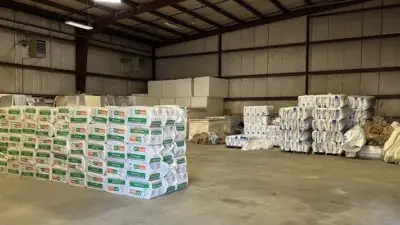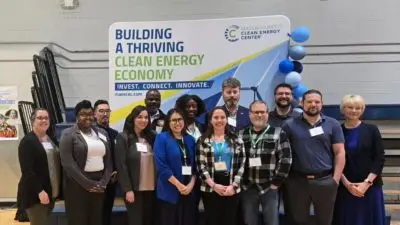Every day homeowners and renters make changes to their homes and habits to be more energy efficient. When you add up all of the small changes, it makes a big impact on the amount of carbon emissions you prevent from entering the atmosphere and the money that stays in your wallet instead of going to wasted energy use. What if something you heard doesn’t exactly do what you thought? We’re here to clear up some common energy efficiency misconceptions and explain why they just aren’t true!
Ceiling Fans Cool Rooms
We’ve all experienced the cooling effect of a good fan but leaving a fan on when you’re not in the room is wasting energy (and money!). Ceiling fans cool people by moving the air around, not cooling the air in the room. It’s the feeling of the moving air on our skin that makes us feel cooler and not an actual change in temperature in the space. Ceiling fans do not cool rooms, they cool people, which is why it’s so important to use them properly. Don’t waste energy moving air around an empty room when there’s no one inside the room to cool.
Electronics Don’t Use Energy When They’re Off
The fact is that electronics still use energy when they are turned off but still plugged in. According to the National Resources Defense Council (NRDC), “a quarter of all residential energy consumption is used on devices in idle power mode.” While that might seem like a lot, think about your microwave, tv, computer, phone charger, coffee maker, game console, and other electronics you regularly use and leave plugged in! It all adds up and you might be surprised how little per day you actually use some items like a microwave! The best pro tip we can give you is to use advanced power strips to easily cut off energy supply to your devices at night when you’re sleeping or when they’re not in use when you’re at work. Get advanced power strips at no-cost to you by signing up here.
Setting Your Thermostat Lower Cools Faster
We’ve all been there. We’re really hot or really cold and we want immediate comfort from our heating and cooling systems. If you set the temperature super high or low out of desperation, thinking that it’ll cool (or heat) faster, that’s unfortunately not the case. Your AC system doesn’t work faster or harder to get you the comfort you want, it simply works longer because of the extreme temperature setting. If you forget to set the temperature back to normal once you’re comfortable, you end up wasting energy with a temperature that’s unnecessarily low. Just set it at the ideal temperature you want and have a little patience as your body (and AC) adjusts!
Washing Dishes by Hand Saves Water
This might have been the case 15 years ago, but with technological improvements in energy efficiency, newer dishwashers are designed to conserve water. The NRDC says that “you use up to 27 gallons of water per load by hand versus as little as 3 gallons” with an energy-efficient dishwasher. Even if you fill one side of the sink with soapy water and rinse the dishes all at once, a dishwasher still is probably saving more water. As tempting as it is to pre-rinse or pre-wash, skip those steps for a more energy-efficient way to clean. Every drop counts!
Preventative Maintenance Isn’t Necessary
It’s time to stop thinking of preventative maintenance as an upsell, an option, or a waste of money. In fact, it can actually save you money! Think about the preventative service you get your car or a health check-up when you’re feeling good. It’s the same concept, but for your heating and cooling systems. The U.S. Department of Energy, among other energy experts, recommend annual preventative maintenance to reduce energy, save money, avoid surprise breakdowns, and prevent costly repairs. Preventative maintenance is just part of protecting your investment and the range of benefits are worth it!
Closing Vents Will Lower Energy Costs
From busted air ducts to system damage, closing vents to increase comfort in specific areas of your home is never the answer. It doesn’t save you any money and it actually increases the energy consumption as your system attempts to heat and cool your home with air flow restrictions that the system senses as unusual. The good news is that there are plenty of solutions for improving temperature consistency throughout your house and giving specific rooms extra attention. With insulation upgrades, home air sealing, and ductless mini-split installations, our energy experts have options that will help you solve your energy efficiency and comfort concerns.
Older Historic Homes Can’t Be Energy Efficient
Massachusetts is full of beautiful, historic homes and with the right updates, they can be energy efficient just like newer houses. Energy efficiency is not reserved for brand new homes; owners of older homes have the chance to lower their energy costs year-round and reduce the carbon emissions that the household is putting into the atmosphere with the right updates. A no-cost virtual Home Energy Assessment is great for an older home because you can learn a lot from your custom home energy report. There are also a lot of benefits you can access so that updating your home is affordable and achievable like no-cost programmable thermostats, no-cost water-saving devices, and incentives for 75%+ off insulation! You can also access the Mass Save HEAT Loan for 0% financing for up to $25,000 for 7 years.
If you’re making the right moves to a more energy-efficient you, then we’re right here to support you every step of the way. At HomeWorks Energy, we’re your one-stop-shop for home energy efficiency. We offer our neighbors preventative maintenance, heating and cooling repairs, insulation and air sealing, and $0 Home Energy Assessments. As a Mass Save® partner, we can show you how to access all the rebates and incentives such as 100% off air sealing, 75%+ off insulation, and more! Visit our website ,here to sign up for a no-cost Home Energy Assessment or call (781) 305-3319 to get more information about our other service offerings. Let’s tackle energy efficiency together!








